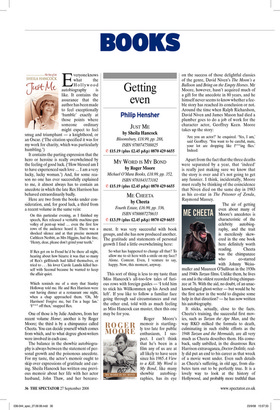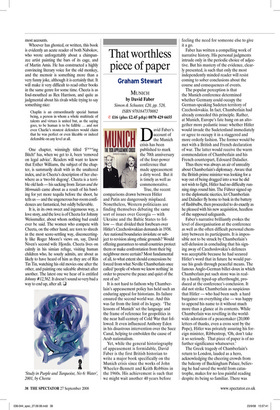E veryone knows what the Hollywood autobiography is like. It contains
the assurance that the author has been made to feel exceptionally ‘humble’ exactly at those points where someone ordinary might expect to feel smug and triumphant — a knighthood, or an Oscar. (‘The citation specified it was for my work for charity, which was particularly humbling.’) It contains the parting expression that the hero or heroine is really overwhelmed by the feeling of good luck. (‘How blessed am I to have experienced such love ... I am a very lucky, lucky woman.’) And, for some reason no one has ever successfully explained to me, it almost always has to contain an anecdote in which the late Rex Harrison has behaved extraordinarily badly.
Here are two from the books under consideration, and, for good luck, a third from a recent volume in the same vein:
On this particular evening, as I finished my speech, Rex released a veritable machine-gun volley of pent-up wind ... even the first few rows of the audience heard it. There was a shocked silence and at that precise moment Cathleen Nesbitt, as Mrs Higgins, had the line, ‘Henry, dear, please don’t grind your teeth.’ If Rex got on to Freud he’d be there all night, hearing about how bizarre it was that so many of Rex’s girlfriends had killed themselves, or tried to . . . his lover Carole Landis killed herself with Seconal because he wanted to keep the affair quiet.
Which reminds me of a story that Stanley Holloway told me. He and Rex Harrison were out having dinner at a restaurant one night, when a chap approached them. ‘Oh, Mr Harrison! Forgive me, but I’m a huge fan.’ ‘F*** off then,’ snapped Rex.
One of those is by Julie Andrews, from her recent volume Home; another is by Roger Moore; the third is by a chimpanzee called Cheeta. You can decide yourself which comes from which, and to what degree ghost-writers were involved in each case.
The balance in the showbiz autobiography is always between the statement of personal growth and the poisonous anecdote. For my taste, the actor’s memoir ought to skip over expressions of gratitude and caring. Sheila Hancock has written one previous memoir about her life with her actor husband, John Thaw, and her bereave ment. It was very successful with book groups, and she has now produced another. The gratitude and statements of personal growth I find a little overwhelming here:
So what has happened to change all that? To allow me to sit here with a smile on my face? Alone. Content. Even, I venture to say, happy. Now, this moment, anyway.
This sort of thing is less to my taste than Miss Hancock’s all-too-few tales of furious rows with foreign guides — ‘I told him to stick his Willkommen up his Arsch and left’. If you like to follow a familiar face going through sad circumstances and out the other end, told with as much feeling as Miss Hancock can muster, then this one may be for you.
Roger Moore’s memoir is startlingly too late for public enthusiasm, I suspect. I can’t think that he’s been in a film any of us are at all likely to have seen since his 1985 A View to a Kill. My Word is My Bond, like many showbiz autobiographies, has its eye on the success of those delightful classics of the genre, David Niven’s The Moon’s a Balloon and Bring on the Empty Horses. Mr Moore, however, hasn’t acquired much of a gift for the anecdote in 80 years, and he himself never seems to know whether a feeble story has reached its conclusion or not. Around the time when Ralph Richardson, David Niven and James Mason had died a plumber goes to do a job of work for the character actor, Geoffrey Keen. Moore takes up the story:
‘Are you an actor?’ he enquired. ‘Yes, I am,’ said Geoffrey. ‘You want to be careful, mate, your lot are dropping like f***ing flies.’ Indeed.
Apart from the fact that the three deaths were separated by a year, that ‘indeed’ is really just making sure we know that the story is over and it’s not going to get any funnier. I think, incidentally, Moore must really be thinking of the coincidence that Niven died on the same day in 1983 as his co-star in The Prisoner of Zenda, Raymond Massey.
The air of getting even about many of Moore’s anecdotes is characteristic of the celebrity autobiography, and the trait is mercilessly skewered in the one book here definitely worth reading. Cheeta was the chimpanzee who co-starred with Johnny Weissmuller and Maureen O’Sullivan in the 1930s and 1940s Tarzan films. Unlike them, he lives on and is the oldest recorded living chimpanzee at 76. With the aid, no doubt, of an unacknowledged ghost-writer — but would he be the first actor in the world to disguise some help in that direction? — he has now written his autobiography.
It sticks, actually, close to the facts. Cheeta’s training, the successful first movies, such as Tarzan the Ape Man, and the way RKO milked the formula to death, culminating in such risible efforts as the 1948 Tarzan and the Mermaids, are all very much as Cheeta describes them. His comeback, sadly unbilled, in the disastrous Rex Harrison extravaganza, Doctor Dolittle, really did put an end to his career as that wreck of a movie went under. Even such details as Cheeta’s suffering, in old age, from diabetes turn out to be perfectly true. It is a lovely way to look at the history of Hollywood, and probably more truthful than most accounts.
Whoever has ghosted, or written, this book is evidently an acute reader of both Nabokov, who wrote unforgettably about a chimpanzee artist painting the bars of its cage, and of Martin Amis. He has constructed a highly convincing literary voice for the old monkey, and the memoir is something more than a very funny joke, although it is certainly that. It will make it very difficult to read other books in the same genre for some time. Cheeta is as foul-mouthed as Rex Harrison, and quite as judgmental about his rivals while trying to say something nice:
Chaplin is an extraordinarily special human being, a person in whom a whole multitude of talents and virtues is united but, as the saying goes, to be human is to be fallible ... and not even Charlie’s stoutest defenders would claim that he was perfect or even likeable or indeed defensible on any level at all.
One chapter, winningly titled ‘F***ing Bitch!’ has, when we get to it, been ‘removed on legal advice’. Readers will want to know that Esther Williams, the subject of the chapter, is summarily dealt with in the unaltered index, and in Cheeta’s description of her elsewhere as a ‘two-bit dugong’. Cheeta is a terrible old lush — his sacking from Tarzan and the Mermaids came about as a result of his bawling for yet more tequila before the shoot, he tells us — and the ungenerous bar-room confidences are fantastical, but oddly believable.
It is, in its own sweet and ingenuous way, a love story, and the love is of Cheeta for Johnny Weissmuller, about whom nothing bad could ever be said. The women who compete with Cheeta, on the other hand, are torn to shreds in the most score-settling way, disconcertingly like Roger Moore’s views on, say, David Niven’s second wife Hjordis. Cheeta lives on calmly in his simian refuge, visiting human children who, he sourly admits, are about as likely to have heard of him as they are of Rin Tin Tin, watching his old movies one after the other, and painting one saleable abstract after another. The latest one we hear of is entitled Johnny #12,562. It doesn’t sound so very bad a way to end up, after all. q











































































 Previous page
Previous page